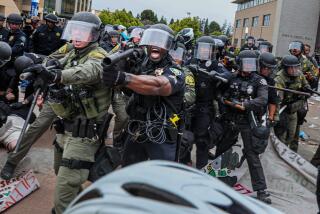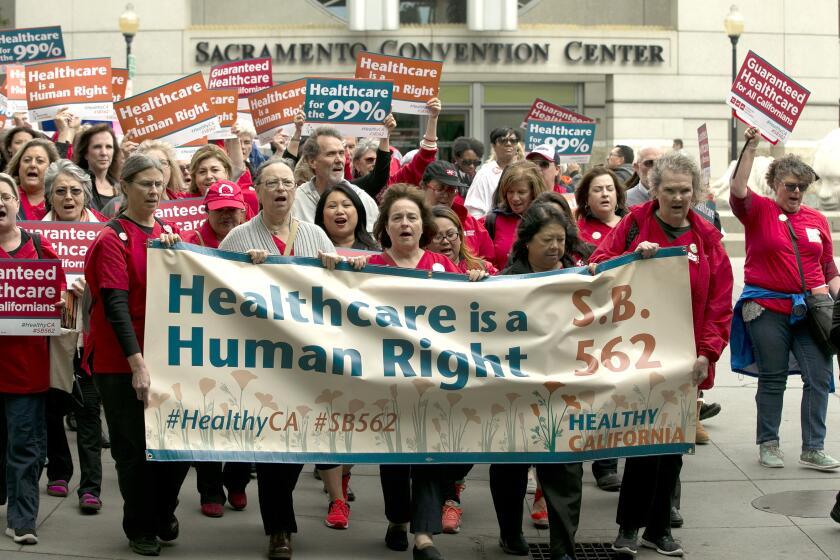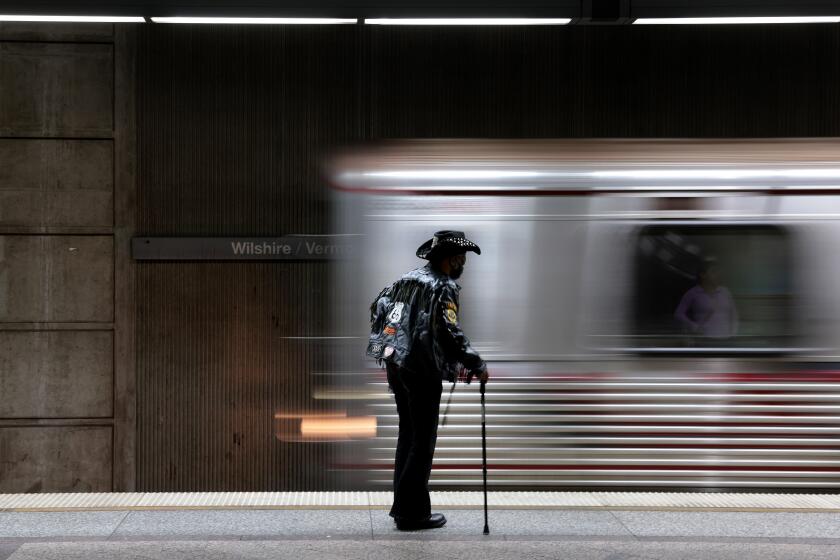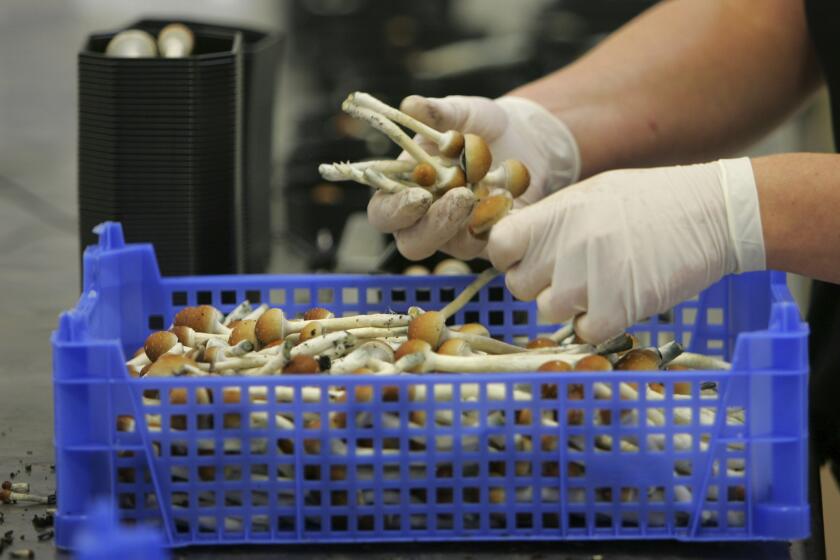Mayor’s Plea to Firms: Pay Jurors Longer
Was he ushered into the jury assembly room through a special entrance? No way. Did he ask to be excused? Not on your life.
When the mayor of the nation’s second-largest city reported to Room 5-302 of the Criminal Courts Building, a stone’s throw from his office at Los Angeles City Hall, he stood in line just like everybody else.
“It’s a welcome change to be treated like a normal human being again,” Richard Riordan said Monday as he joined 150 or so fellow citizens for an hourlong, check-in and orientation.
Except for the handful of reporters and television crews waiting outside for his arrival (and the LAPD bodyguard who accompanied him), the multimillionaire entrepreneur-turned-mayor went through the same routine as everybody else.
He stood at the back of the line entering the jury room (he arrived later than most, having just come from an early morning ice-skating session at a Culver City rink), filled out his forms (after borrowing a pen from a reporter) and listened patiently as television monitors delivered detailed instructions (complete with a history of the jury system by Judge Michael Cowell).
Although the mayor did a little bit of low-key glad-handing, he seemed most intent on using his bully pulpit to advocate for some controversial proposals to change the jury system. One of them probably won’t sit well with some of his many supporters in the business community.
Riordan told a Times reporter that everyone should be required to serve as long as it takes to complete a trial, in hopes, he said, of putting pressure on companies that limit the number of days they pay their employees while on jury duty.
“It puts a huge, unfair burden on governments and companies that don’t have a limit,” Riordan said, “and it really limits who can serve on juries.”
Then he asked a fellow juror, Susan Brooks, where she works and what her employer’s policy is.
“Xerox,” answered Brooks, “and I think it’s unlimited.”
“Good corporate citizen!” responded the mayor.
Many, if not most, companies set a limit on the number of days they will pay employees on jury duty. To continue to serve without pay would pose an economic hardship for most employees (jurors are paid $5 a day, plus mileage), so most judges will let them off the hook for a trial expected to last longer.
The limited-pay practice has long been criticized by many in the judicial system, which is hard-pressed in areas like Los Angeles to find enough people to serve. Critics of the practice say it limits the jury pool mostly to retired people, the unemployed and many government workers.
Ray Remy, head of the Los Angeles Area Chamber of Commerce and once a top deputy to former Mayor Tom Bradley, said he would encourage Riordan to rethink his position.
*
“With all due respect to the mayor’s suggestion, that would become a major cost to a large number of businesses . . . a pretty significant burden, especially to the smaller organizations.”
Remy said the chamber has taken positions on several of the judicial reforms proposed by a state committee last spring, but the unlimited-pay suggestion was not among them.
Yet Remy said he could easily guess what the business community’s reaction would be:
“It would not be widely applauded by many of our members.”
“It would be seen as yet another financial burden on the private sector,” even though many firms support having their employees participate in the justice system, Remy added.
Most employers can’t afford to have key people out for long periods of time, let alone pay their salaries, he continued.
In speaking to a Times reporter, the mayor singled out The Times as a corporation that limits paid jury service for employees.
*
The Times pays for a maximum of 10 days of service, said R. Marilyn Lee, vice president for public affairs. She added that the newspaper does as much as it can to support the jury system.
“We recognize that jury service is an important civic duty that we want to encourage, but the economic reality is that it is a financial strain,” Lee said. She added that the newspaper, which has approximately 4,800 full-time employees, picked up the tab for the almost 700 who had jury duty last year.
Riordan later mentioned that the downtown law firm he helped found, Riordan & McKinzie, also limits the days it will pay for. Though Riordan resigned from the firm after his 1993 election, he said he would encourage his former partners to change that policy, “or else I’m going to sound like a sanctimonious hypocrite.”
A veteran of other jury duty sessions--he reported in Van Nuys during his 1993 campaign but never got picked for a trial--Riordan brought along a couple of books and a sheaf of papers to help him pass the time.
He read for a while from “A Good Life: Newspapering and Other Adventures” by former Washington Post Editor Ben Bradlee. He also helped a fellow prospective juror work a jigsaw puzzle--a covered bridge surrounded by fall foliage.
The mayor also kibitzed with a number of other prospective jurors who greeted him, spending the longest time with a young lawyer, whom he quizzed about the profession these days.
And he dozed off briefly while waiting for his first and only call for a possible jury seating.
*
After Riordan reached the courtroom, the questioning was postponed until 1:30 today, so the mayor and the rest of the prospective panelists got to knock off early.
If past experience is any indication, Riordan may not wind up on a panel. He recalled the only time he was questioned for seating during his 1993 stint.
“It was a capital case, and the judge asked me if I would have a hardship [serving on a jury for] a trial that would last nine months. I told him that would depend on the outcome of the election,” Riordan said. He was dismissed.
Several people seemed surprised--even impressed--to find the mayor among them.
“That’s nice--I’d really like to meet him,” said Anita Gonzalez, who said she is currently unemployed.
But some fellow jurors were more nonchalant. “He’s got to come, just like everybody else,” said Gaye Lynn Mims, 35, a pharmacy clerk who was answering her fourth summons.
Times staff writer Maki Becker contributed to this report.
More to Read
Start your day right
Sign up for Essential California for news, features and recommendations from the L.A. Times and beyond in your inbox six days a week.
You may occasionally receive promotional content from the Los Angeles Times.







